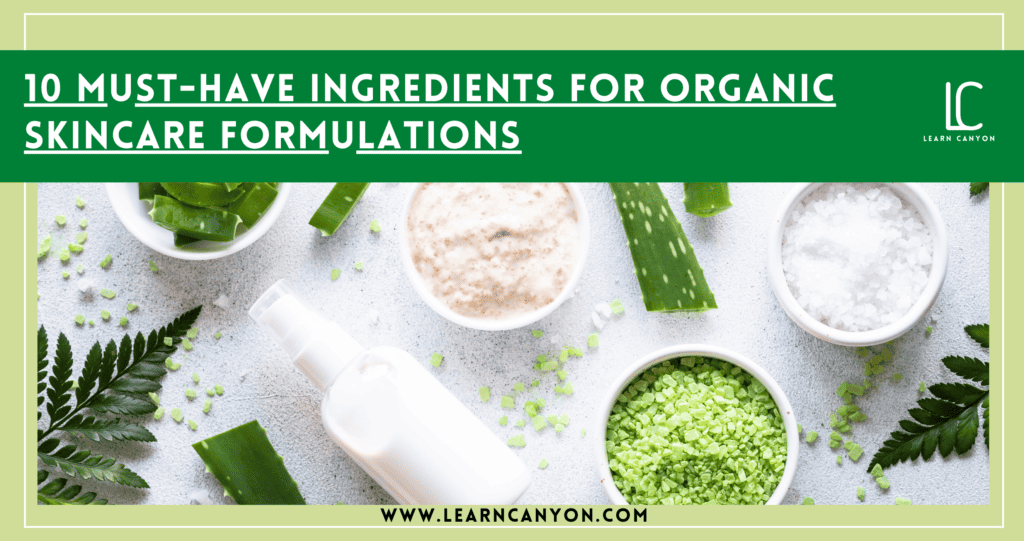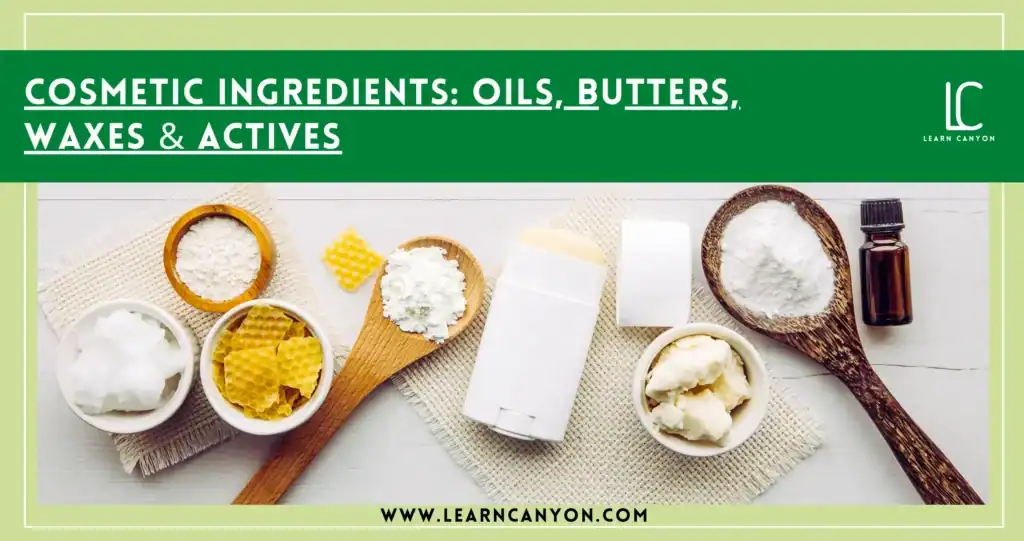Are you someone who loves to take care of your skin and hair, but you are confused about whether to go organic or stay on your current commercial chemical enriched products?
Well, you will be amazed to know how the market trend and the preferences of people have changed in recent years. Personal care is now beyond wash, rinse and repeat because people are finally waking up.
Over the last decade, products that are formulated by using ingredients for organic skincare formulation have been in high demand because people are making conscious choices towards a healthy life and a healthy environment.
No doubt, you spent so much money and effort to make your appearance nothing but the best. But, have you ever wondered if you’re spending your hard earned money on the right products or just spending on buying products which will harm your body in the years to come? If not, then it’s time you give it a thought.
Synthetic and chemical based skin and hair care products are unhealthy as compared to organic products because they expose not only your skin and hair but overall health to toxins and harmful chemicals.
The use of organic ingredients in your personal care products gives you the many benefits like;
- Safer and gentler on skin
- Environment-friendly
- Free from unhealthy synthetic irritants and chemicals
- Nourishes and promotes healthy skin and hair
- Give Value for money
- Produce Better results
Due to the many benefits that organic personal care products provide, it’s time to break free from our everyday routine.
Dive into the world of organic products
1. Safer and gentler on skin: Conventional products are typically irritant and harmful to the skin and hair since they contain harsh chemicals and synthetic components like sulphates. Furthermore, they can occasionally result in allergies and specific illnesses, making their use wholly dangerous. Conversely, components included in organic products include vitamins, fruit extracts, proteins, and essential oils.
2. Environment friendly: Conventional components, commonly referred to as chemical and synthetic-based additives, are bad for the environment. Because they contaminate the water and soil when they wash down, they have an effect on everything they come into contact with. This is due to the fact that natural substances like fruit extracts, essential oils, and synthetic sulphates break down more quickly and biodegrade than chemicals like parabens, synthetic sulphates, and petrochemicals, which are harder to break down and pose no environmental risk. Safe and environmentally acceptable extraction techniques are employed to acquire organic components.
Another justification for using organic foods is that they are cruelty-free, meaning no animals are harmed in the production process. In any case, everyone wins!
3. Free from unhealthy synthetic irritants and chemicals: Healthy results on the skin and hair is the main reason for the increased demand for organic ingredient rich products. Chemicals and synthetics do long term damage and strip your hair or skin of moisture despite all the claims they make to keep them healthy, strong, and nourished.
4. Nourishes and promotes healthy hair and skin: Using chemical-based products on a regular basis might lead to negative issues including skin breakouts or damaged scalps.
5. Value for money: Undoubtedly, organic ingredients are comparatively costly. But, if you see through the pros and cons, you’ll be convinced that organic ingredients are worth that extra penny. They are more effective and offer more benefits as compared to traditional chemical ingredients.
6. Better results along with improved overall health: The aforementioned benefits are ample evidence that products containing organic ingredients yield superior outcomes.
Now that we are aware of the benefits of organic ingredients and their benefits let us look at,
10 Must-Have Ingredients for Organic Skincare Formulation
1: Aloe Vera:
We’ve all heard about the benefits of aloe vera as a moisturizer and the soothing characteristics it has for the skin, but did you realize it has other uses for the skin?
Aloe vera is an excellent natural moisturizer that helps relieve dry skin. It also possesses anti-inflammatory effects, which can aid in the reduction of blemishes and wrinkles. Furthermore, aloe vera is non-irritating and can be used on any skin type. So, how did aloe Vera acquire these properties?
Aloe Vera is a natural product that is obtained Aloe barbadensis miller. Aloe vera is now a days frequently used in the field of cosmetology.
Let us now look in the properties that make Aloe Vera a magic herb. Aloe Vera contains 75 potentially active constituents: vitamins, enzymes, minerals, sugars, lignin, saponins, salicylic acids and amino acids.
The vitamins found in aloe vera are vitamins A (beta-carotene), C and E. These vitamins are responsible for the antioxidant activity. These antioxidant activity neutralizes free radicals that are found to be detrimental to the skin health.
Aloe Vera contains 8 enzymes that help to reduce excessive inflammation when applied to the skin topically.
For the Moisturizing and anti-aging effect the sugars in aloe vera help in binding moisture into the skin. Aloe stimulates fibroblast which produces the collagen and elastin fibers making the skin more elastic and less wrinkled. The sugars in aloe vera are also known for its novel anti-inflammatory properties.
Aloevera has cohesive effects on the superficial flaking epidermal cells by sticking them together, which softens the skin..
Hormones that are found in Aloe Vera help in wound healing and have anti-inflammatory action.
The essential amino acids along with salicylic acid found in Aloe vera possess anti-inflammatory and antibacterial properties.
Aloe vera not only increases the collagen content of the wound but also changes the collagen composition and it accelerates wound healing and improves the skin condition.
The aloe vera has an antioxidant protein that scavenges the free radicals and reduces the pigmentation of the skin and also the fine lines found in skin.
Aloe vera contains 6 antiseptic agents that all have inhibitory action on fungi, bacteria and viruses and acts as antibacterial and antifungal.
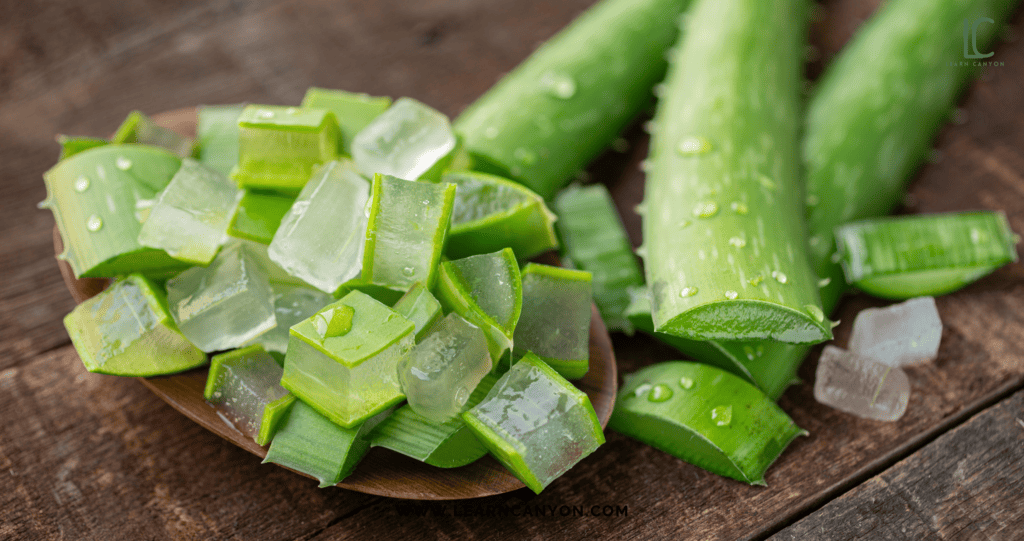
2. Shea Butter
Nuts from the Shea tree are the primary ingredient of Shea butter. It is easy to apply to the skin and has a creamy consistency with an off-white or ivory colour. Shea butter’s high vitamin and fatty acid content makes it a useful cosmetic component for softening skin. Shea butter also has medicinal and anti-inflammatory properties. Shea butter, especially on the face, can aid in the calming, toning, and conditioning of your skin.
Shea butter contains anti-aging, medicinal, emollient, and anti-inflammatory qualities.
Shea butter contains vitamin A and E which imparts the antioxidant property. This helps relieve the skin of redness and swelling and works as an excellent anti-inflammatory agent helpful in conditions common to sensitive skin like chapped lips and skin outbreaks.
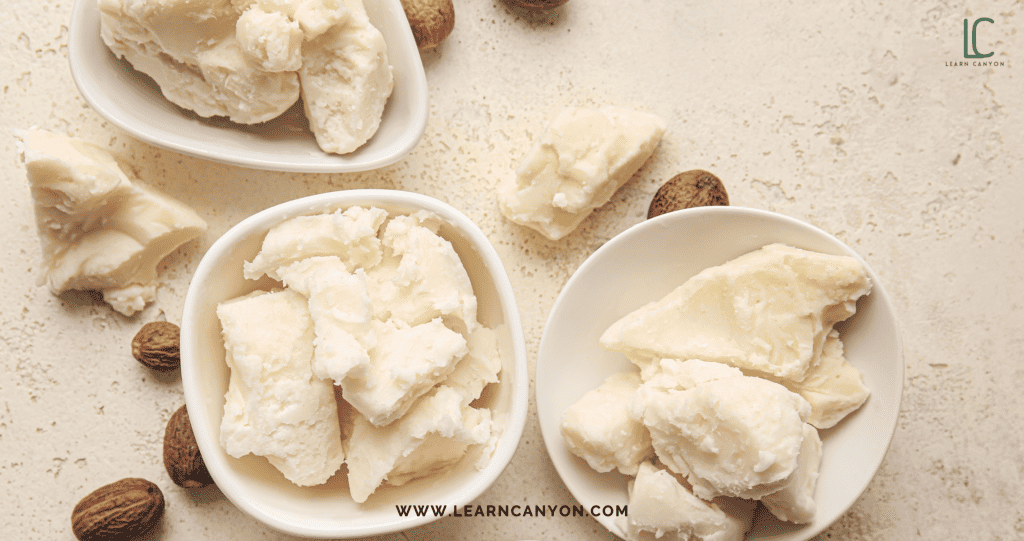
3. Jojoba Oil
The nut of the jojoba plant is used to make jojoba oil.
A mild carrier oil, jojoba oil blends well with other essential oils. Pure jojoba oil has several uses, including anti-acne effects. Dry skin can benefit from it.
- In addition to being a humectant, it possesses moisturizing properties.
- It is non comedogenic, antibacterial, and antioxidant—meaning that it is less prone to accumulate on skin and clog pores.
- Its waxy consistency enables it to leave a calming layer on the skin. It also regulates the production of sebum.
As a result of its unique chemical makeup, jojoba oil can replicate the characteristics of skin sebum, helping to balance out the skin. It is also a great option for skin that breaks out easily because it has antibacterial qualities that help fight off some kinds of bacteria.
Jojoba oil is high in antioxidants including vitamins A and E, as well as omega-6 fatty acids, which are important components of the skin’s barrier. It is also a humectant, which means it works to keep moisture in the skin. This protective barrier, along with the anti-inflammatory actions of vitamin E, allows the skin to breathe and concentrate on the healing process.
Jojoba oil is non-acnegenic, which means it does not cause acne. Because Jojoba Oil is remarkably similar to human skin oils, using it can mislead the skin into believing it has created enough oil, balancing oil production without increasing acne or other skin problems. Jojoba also naturally repels germs, which aids in the prevention of bacterial growth on the skin.
Jojoba Oil is similar to our natural skin oils in that it quickly penetrates and soothes the skin, promoting healthy, bright skin without clogging pores or leaving a greasy residue.
4. Rosehip Oil
It comes from the rose bush Rosa Canina, which is predominantly grown in Chile. Rosehip oil is extracted from the rose plant’s fruit and seeds.
It contains a wealth of vitamins, antioxidants, and essential fatty acids that can help nourish and hydrate your skin. It may also reduce the visible signs of aging and help clear up scarring.
Rosehip oil is one organic ingredient that helps boost collagen formation and hence can be used as the building block of skin, collagen as we all know is the most essential element to maintain the skin elasticity and firmness. Our body naturally makes less collagen as we age and starts signs of aging.
This fact emphasises the use of Rosehip oil that is rich in vitamin A. this vitamin is necessary for the production of collagen. Not only this but also the fact that rosehip has the ability to increase the skin elasticity makes it an ideal ingredient from organic source to help combat signs of ageing.
Rosehip oil helps exfoliate and brighten skin. The process of natural exfoliation that happens with the use of this oil helps reduce dullness and leaves you in return with a glowing, vibrant skin.
This is possible due to the presence of vitamin A that is also known as retinol. The retinol in rosehip oil encourages skin cell turnover which helps the pigmented outer layer being replaced by fresh and lighter skin cells.
Vitamins A and E are among the antioxidants found in rosehip oil. It has been demonstrated that these vitamins work in tandem to prevent noticeable UV damage. They might also aid in avoiding photoaging.
Rosehip oil helps reduce scars and fine lines.
Rosehip oil is rich in essential fatty acids and antioxidants, which are integral for tissue and cell regeneration in the skin. It’s no wonder the oil has long been used as a remedy for wound healing, as well as the reduction of scars and fine lines.
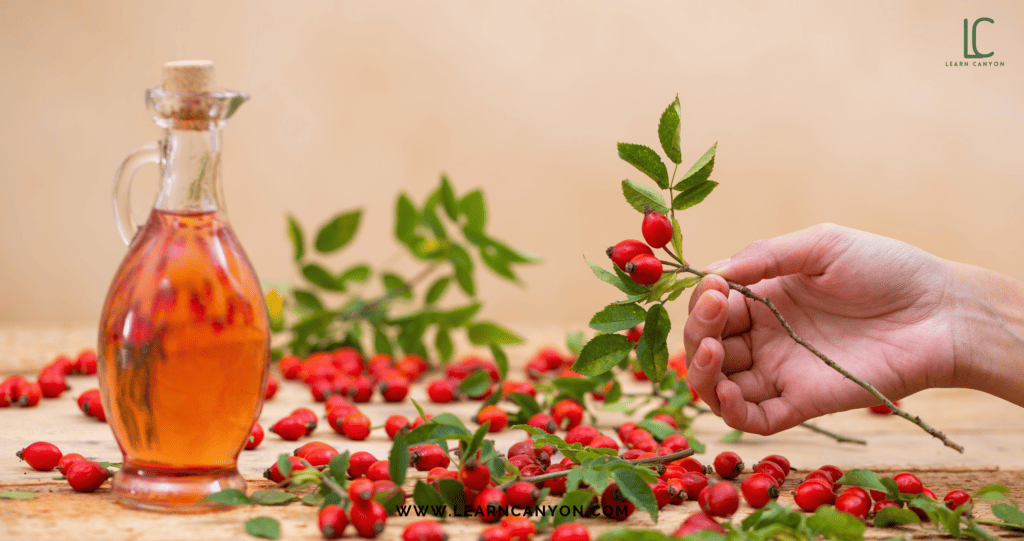
5. Green Tea Extract
The good news is that green tea’s polyphenol antioxidants can shield your cells from UV ray damage and may even be able to reverse most of the sun’s harmful effects.
Harmful free radicals are produced in the skin by excessive UV exposure, and repeated exposure to these free radicals leads to the deterioration of DNA, proteins, including collagen and elastin, and lipids in skin cells. As a result, skin cells become destroyed and are unable to regenerate into healthy ones, resulting in drooping, thin, and wrinkled skin.
While all of this may make you want to hide from the sun, an increasing amount of studies indicates that green tea’s polyphenol antioxidants have photo protective qualities, which shield our cells from the harmful effects of UV radiation.
These antioxidants help the skin to prevent from premature ageing and visible signs of sun damage.
6. Chamomile Extract
For thousands of years, people have used chamomile as a herb to help them sleep and reduce stress.
In skincare product formulations, chamomile extracts are utilized to calm, heal, and soothe skin. This is understandable given that it has significant concentrations of the antioxidant apigenin, which accounts for its skin-benefiting properties.
Chamomile is frequently used to relieve rashes and sunburn-related skin irritation. Inflammatory skin conditions are treated with chamomile extract.
The anti-oxidant apigenin, which is found in chamomile, helps to reduce inflammation by preventing the release of molecules that cause inflammation.
When they applied crushed chamomile to red, irritated skin, the ancient Greeks knew they had found something useful. This is due to chamomile’s apparent ability to reduce inflammation, which is the root cause of skin redness.
Chamomile deeply but gently penetrates the skin to alleviate inflammation.
Chamomile for soothing delicate skin.
Sensitive skin types seem to benefit most from chamomile’s anti-inflammatory and restorative qualities.
Three compounds in chamomile—bisoprolol, chamazulene, and apigenin give it soothing and healing properties that are great for sensitive skin.
This explains its soothing and anti-inflammatory benefits, and how it helps with redness and irritation
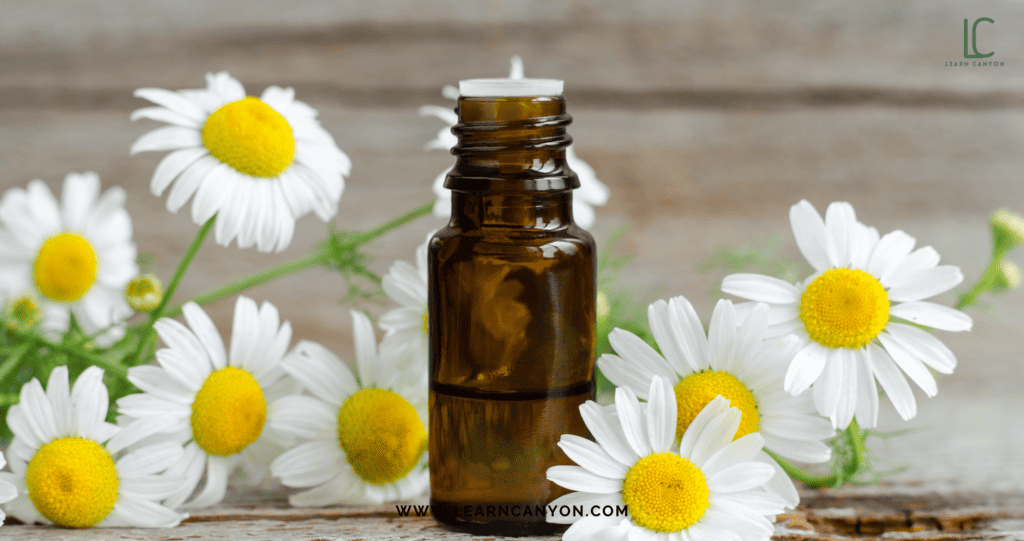
7. Calendula Extract
Natural oil called calendula oil is derived from calendula officinalis, or marigold flowers. It’s frequently applied as an alternative or complementary therapy.
Due to its antifungal, anti-inflammatory, and antibacterial qualities, calendula oil may be helpful in diaper rash relief, eczema relief, and wound healing. It has antibacterial properties as well.
Calendula oil is and Anti-inflammatory. That soothes and calms skin. It can potentially help speed up wound healing. Calendula oil is good for all skin types, but is most effective for those skin types that have redness, acne, or sensitive skin as they might see more benefit from using products that are rich in organic calendula oil.
The anti-inflammatory property of calendula oil is due to the presence of the strongest compound in the flower that is likely a triterpenoid called faradol. Faradol is highly responsible for the significant anti-inflammatory effect produced by calendula oil.
8. Vitamin E
It’s general knowledge that vitamin E is a hydrating powerhouse that leaves skin feeling silky, smooth, and glowing.
Vitamin E is a fat-soluble vitamin that functions as an antioxidant to help shield your body’s cells from harm. It is present in sebum, or skin oil, which naturally forms a barrier to retain moisture in the skin. Therefore, the face and other oilier skin areas have higher vitamin E content.
Since Vitamin E prevents skin from losing moisture, it likely improves the effectiveness of moisturizers. It shields cells from harm. furthermore softens skin.
By absorbing UVB rays and lowering your skin’s inflammatory reaction, which includes swelling, reddening, and thickening, vitamin E may also lessen the effects of sun damage.
9. Lavender Oil
Lavender oil is obtained from the handpicked Lavender flowers. The flowers are subjected to steam distillation to get the lavender essential oil and the lavender hydrosol.
A match made in heaven is what a combination of lavender oil and the skin can be called. In addition to having strong anti-inflammatory qualities, lavender oil has a healing aroma and is incredibly calming for the skin.
Lavender oil aids in acne treatment. Yes, using an lavender essential oil to treat acne makes great sense. Insufficient oil production on the skin frequently causes acne flare-ups. In an attempt to compensate, dry skin may begin to overproduce sebum, the natural oil found on your skin, which can clog pores and cause acne. Lavender oil is non-comedogenic, meaning it leaves skin feeling softly moisturized.
If you’ve been scratching at dry skin areas and there doesn’t seem to be any hope, try lavender oil for some much-needed comfort. As we previously discussed, lavender oil is excellent in maintaining the proper balance of moisture in your skin, preventing it from becoming overly dry or oily. To encourage soft, itchy-free skin, massage a lavender oil-containing skin care product all over your body and onto particularly dry regions.
Warm the rich, lavender-infused cream between your fingers and apply it to particularly dry, flaky areas of your face to instantly smooth out rough skin. To achieve calm and balanced skin, use a daily care moisturizer enriched with lavender as your daily fight against dryness.
Lavender oil possesses Anti-inflammatory properties which make it a Superstar ingredient.
Lavender is well renowned for its ability to manage stress and reduce anxiety. It should come as no surprise that it has the same relaxing effects on your skin. Calming lavender oil can be applied topically to help lessen redness, blotchy areas, and scars from acne. Because of its anti-inflammatory qualities, lavender oil is excellent for calming and repairing skin that has become inflamed or reddish due to exposure to the sun, insects, or bacteria.
10. Honey
Considering the fact that Honey contains potent ingredients that both speed up healing and minimise inflammation, honey is considered healthy for your skin. One of honey’s most valued properties is its capacity to eliminate microorganisms from the skin. It has been used for generations to heal wounds and is considered a valued element worldwide. Honey has Antibacterial properties. We all know that honey has numerous components that promote skin health.
Anti-Inflammatory Properties: When applied topically, honey has a potent anti-inflammatory impact that makes it beneficial for a range of inflammatory skin disorders, such as psoriasis, atopic dermatitis, and eczema.
Antimicrobial and Antibacterial Properties: Honey’s potent antimicrobial, antibacterial, and antifungal qualities enable it to combat skin infections.
Natural Moisturizer and Humectant: One such natural moisturizing agent is honey. It is beneficial for anti-aging and dry skin disorders because it penetrates the skin deeply to draw moisture in.
HONEY HYDRATES AND DEEPLY MOISTURIZES THE SKIN.
Honey works well as a moisturizer because of its humectant natural qualities. Honey’s ability to penetrate deeply into the skin and hydrate the underlying layers is facilitated by its enzyme activity. Skin that is softer, plumper, and naturally luminous is the outcome of this.

In Conclusion
We can say that almost all the organic ingredients described here contain various phytochemicals including vitamins, enzymes, phenols, flavonoids and various fats that are beneficial for the wellbeing of the skin and helping it maintain hydration, fight acne, deal with hyper pigmentation and maintain the skin acid balance.
All these properties like anti-inflammatory, antimicrobial, antifungal, radical scavenging ability and moisturising, etc. are the star properties that make the organic ingredients discussed above very helpful when incorporated in skin care products,




